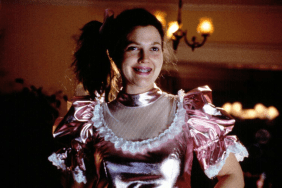It’s not too often that a writer achieves the same level of celebrity status as an actor or even a director but when you say “Mamet” to anyone in the entertainment business, they’ll immediately know who you’re talking about and understand the reference. After all, it’s not just the man’s name as it is his style of writing, which creates a tone and a feel that many have tried to emulate but few have replicated.
David Mamet was already a respected playwright when he was nominated for an Oscar in 1982 for his screenplay for The Verdict in 1982, followed shortly by two Tony nominations and a career as an in-demand Hollywood screenwriter writing movies like The Untouchables and Hannibal. As a director, Mamet has spent his time jumping genres from crime dramas to comedies and political thrillers, incorporating his distinctive style of dialogue and speech patterns that’s helped put his last name among the ranks of “Hitchcock” and “Shakespeare.” His life and filmmaking career have been fairly eclectic and he doesn’t do a ton of interviews–he was noticeably absent at the junket for his last movie Spartan in 2004– so when ComingSoon.net had a rare chance to take part in a roundtable interview with Mamet, we jumped on it.
Mamet was back in New York to talk about his new movie Redbelt, which kicked off the 2nd Annual ESPN/Tribeca Sports Film Festival. It’s a crime drama (of sorts) set within the world of Jiu-Jitsu and ultimate fighting, starring Chiwetel Ejiofor as Mike Terry, a trainer desperately trying to get the money to save his school, when he’s caught in a situation that forces him to return to the ring to fight in a major martial arts tournament. The eclectic cast includes Alice Braga (City of Men, I Am Legend) as his wife, Emily Mortimer as a lawyer who happens upon Terry’s school by accident, and Tim Allen playing a rare dramatic role as an actor who asks Mike to do stunts on his new film. Mamet has filled the cast with a number of his regulars as well as real-life fighters from the world of mixed martial arts and ultimate fighting.
ComingSoon.net: Was it difficult getting this film greenlit due to the premise?
David Mamet: Yeah, nobody wanted it in Hollywood except for Sony Classics. I think it was my third or fourth film for them, so they said, “Yeah, sure.” I talked to everybody in Hollywood and said, “If you don’t get it, look at the demographics. This is the hugest demographics in the world of young males 18 to 25. They all watch the UFC. Look at what they did last year in DVDs, are you nuts? If they make the worst movie ever made, all these kids are going to watch their movie. Guess who I’m going to put in it,” and they all said, “Yeah, yeah, yeah, no thanks,” They all want to make movies about people standing up on a beach with their arms spread, looking up at the heavens, and twirling because they’ve understood the meanings of life, and indeed, they have.
CS: Can you talk about casting Chiwetel? Obviously, you could have found an actor who had more of a martial arts background, but you went for a strong dramatic actor instead. Was there any concern about getting him trained?
Mamet: Well, he’s a great athlete, so he trained with one of the Gracie brothers in London, then he trained very much over here. He doesn’t have to get in the ring and fight, all he has to do be is two things: a great actor, which he is, and a sufficient athlete to master the moves, which he did.
CS: How did you come across him? Had you seen any of his stage work, for which he just won an Olivier?
Mamet: No, I saw him in “Dirty Pretty Things,” and then I saw him in “Kinky Boots” and I said, “Anyone who could do those two films can do absolutely anything,” and I do believe he can.
CS: Did the two of you talk about working in the theater together some time?
Mamet: I want to do “Hamlet” with him. We talked a lot about it, and I said I’d love to direct him in “Hamlet,” and he said, “Done,” so it’s just a question of finding a mutual amount of time.
CS: His character doesn’t seem like a typical Mamet character if there’s such a thing either. Did you feel that he was a different character than you’ve written before?
Mamet: I don’t know. One of the great things about being in show business, especially about making movies, is that you get to enter into different worlds. I really admire people like Billy Wilder, for example; he made so many different kinds of films. He made one of each kind of film, made so many different kinds of films, so everyone wants to make different kinds of films. I’m really not interested in making the same movie twice.

CS: Why is his character so pure of moral? Does it have anything to do in your mind with his being in the war?
David Mamet: That’s an excellent question. It’s a film noir, and it’s a fight film, so it’s a film about purity, so in a certain way I understand film noir as being kind of the younger brother of tragedy. It’s about the individual trying to come to grips with what seems to be an external defect in the world which he understands as an internal defect in himself. I’ve spent a lot of time working with, not in, but with the military due to this television show “The Unit.” I also spent a lot of time around and being a fighter, training in Jiu-Jitsu, and always so chastened and inspired by the purity of the military and of the other fighters in the marital arts world. What they’re trying to do ideally is to cleanse the lesser elements from themselves in service of a higher ideal, in service of the country and service of the purity of the fighter because what the fighter does is they go through life with an absolute belief in their physical perfectibility. When they believe in that and give themselves over to that, the greater chance they have of prevailing in the world, so that it’s really kind of a physicalization of a quest for morality. It’s also a spiritual quest. It’s like, I can cleanse from myself laziness, sloth, weakness, despair, and there’s going to be a test down the line, it’s true of the military and of the fighters.
CS: Could you explain why you wanted to cast Emily Mortimer opposite him?
Mamet: I’ve always loved her work and one of the nice things about making movies is you get to not only work with old people, you get to work with new people, so if you’ve got a great casting agent, you’ve got wonderful casting people. Sherry Thomas had been given this television show, and I can’t remember if I suggested Emily, or if they suggested her. I think I said I loved her in “Match Point,” but that she wasn’t doing too much, and they said, “Yeah, yeah, yeah, let her do the thing,” so that was it.
CS: You’ve worked with a lot of interesting casts over your career, but you’ve definitely topped yourself with this movie since it’s one of the most eclectic casts from your fighters and you’ve worked with a lot of very serious, theater, dramatic actors. After you wrote this, how did you find the cast and can you talk about working with non-actors like the actual fighters?
Mamet: Well, sure, Ray Mancini is in the movie; I know him as a friend and also as a fellow member of my Jiu-Jitsu academy. Dan Inosanto also, and a lot of the fighters I gained access to them through Renato Magno, who is my teacher and produced the choreographed fights here. Jean Machado is his cousin and Rico Chiapparelli also trained sometimes and helps Renato, and Rico is one of the guys who trained Randy (Couture). I can’t remember how we found Enson Inouethe short is that a lot of those connections come through the Jiu-Jitsu academy.
CS: In this movie, you have many actors you’ve worked before who are familiar with the way you make movies, but you also have a lot of new people and non-actors on board as well, so how did you work them into the mix?
Mamet: Well, fighters are easy. I think anyone who can do something very, very well under a lot of pressure, they’re probably going to make a pretty good actor. Stanislavski said, “Forget acting training, give me an opera singer, I’ll teach them to act in six days.”
CS: There are also people you’ve worked with before: Ricky, David, and your wife obviously, but none of them appeared in “Spartan.” Was there any deliberate reason they didn’t appear in that movie but you brought them back for “Redbelt”?
Mamet: No, I mean I’ve got a bunch of guys who I’m very fortunate to work with, and usually I work with them if and when they are available. The thing about making movies that aren’t big budget is they tend to get put together at the last moment, so a movie that gets put together at the last moment, a lot of times the people who you’d like to work with, being terrific actors, are working. For example, I wanted to put Macy in a movie and he was off directing a movie in South Africa. Had he been available, and there was no part for him, I would’ve written one.
CS: So do you do consciously write parts for people you know?
Mamet: No, I don’t write parts for the people. I just kind of write parts and call on my pals.
CS: Which was the trickiest character to write for this?
Mamet: None of them were hard to write. The characters in this one weren’t hard to write, the plot was hard to write.
CS: Was it hard to differentiate between the two female characters?
Mamet: No, because if you get the story the rest of it is easy because basically if you have a good story and good actresses, you have to do very, very little. They just don’t have that many lines, they’re just acting them.

CS: How important was it to make the fighting scenes authentic versus making something that was watchable?
Mamet: Well I hope it’s watchable, but it’s absolutely authentic. I mean these are the greatest fighters in the world either fighting in the movie, or choreographing the fights. There’s absolutely nothing inauthentic in it, and I don’t think you will find anyone who will say differently because it just is, and so I hope it’s entertaining. I found it entertaining.
CS: Who came up with the three marble system that we see used in the film?
Mamet: I thought of it. I was sitting with Rickson Gracie one day, we were watching a thing that he staged and we were talking about ways to make martial arts, not necessarily mixed martial arts, but perhaps Jiu-Jitsu more film-friendly, so I came up with this idea and that’s where it comes from.
CS: Has anyone stolen that idea yet to use in actual fights?
Mamet: No, they will, but I copyrighted it. The other thing, the actual idea of training under a handicap is fairly widespread in Brazilian Jiu-Jitsu, training using only one arm, training using only your legs. In fact, Randy Couture who is the current champion of the UFC, in his last fight he won with only one arm because his arm was broken.
CS: How do you apply the Jiu-Jitsu philosophies from the film to your own life?
Mamet: Well, there are two ways about how to deal with conflict. One way on how to deal with conflict is, “Oh yeah, oh yeah, oh yeah,” and another way to deal with conflict is to move it to the side, to walk away, not to get involved in conflict if you don’t have to. If you do have to get involved in a conflict with another person, to not bring anger to it, because what’s that going to help, and to not bring fear to it, to try to deflect their anger, to not to carry their weight physically, but to not carry their weight spiritually and emotionally. This sounds touchy-feely, but it’s extremely important in a fight if someone says, “Oh yeah, you blah blah blah,” that person’s not hurting you, so why would you let that get your heart beating? Why would you let that get your adrenaline pumping? Because if your heart’s beating and your adrenaline is pumping, you’re getting weaker, so you train really not to take on not only the other person’s weight physically, but to not take on their emotions, to say, “I’m not getting hurt, I’m going to save position. I’m not going to let this happen to me. Later on, if things are different, I’ll deal with them then.”
CS: Presidential candidate John McCain has been very outspoken against mixed martial arts–he called it “human cockfighting.” What do you think about those comments?
Mamet: Oh, I hadn’t heard them, but I’d just like to make the point: it’s not a mixed martial arts movie, it’s a fight movie and one aspect of it is mixed martial arts.
CS: It’s been four years since “Spartan” but before that, you were far more prolific as a filmmaker. You’ve obviously been very busy with theater, but are you going to try to make more films after taking such a long break?
Mamet: Well, if you grew up in show business, you generally start young, so if you grew up in show business and start young, it means you generally start poor, so if you do those things, what happens is, however old you get, when you walk past the supermarket and its offers of employment with those little strips of paper, you stop and read them. You never stop looking for work, so I’ve just been working every day.
CS: Was “Redbelt” something you’d worked on a long time before it finally came to fruition?
Mamet: It is. In the meantime between “Spartan” I wrote a couple of movies that I thought I was going to direct and they fell through, as movies tend to, and so here we are now.
CS: I’ve spoken to a number of actors who’ve worked with you in the past and whenever you have a new script, actors will jump at the chance to be involved, same with Woody Allen. That being the case, do you find that it’s very easy to get a cast in a movie once you have a new script or play?
Mamet: That’s a great question. There’s two ways to make a movie
well, there’s three ways to make a movie: if you have a lot of money and you go out to all of these actors, then you can get a fairly easy response. You can pay them whatever the going rate is and do the movie on this date. You get a decent response, yes or no, but if you have a script and an idea, and you give it to actors and say, “What do you think?” The only thing worse they will say than no is yes, because it’s always “Yes, but
.” Of course, they’re very busy as we all are, but the third possibility is if you’re making a movie on whatever budget, and you say, “We start shooting this movie on August 5th, would you like to do it?” You can always get a quick response, and most of the time the answer is “yes.” I mean if it’s someone who you think in advance is probably likely to do it because if they’re free, and they like doing anything anyway, and if they like the script, and they want to work with you, why not? Who wouldn’t do it?

CS: When you and Rebecca wrote the music for this, did the songs precede the film or were they influenced by it?
Mamet: She’s a spectacular musician, and I’m a musician myself. I’ve been playing the piano since I was four years old, and I can play anything. If I can hear it, I can play it, and I’ve got a pretty good understanding of musical theory, but she hears stuff that’s just
especially the Brazilian songs
she just hears harmonies and melodies that are off the charts. I’m rather in awe of her composing talent. Sometimes I’ll write a poem and say, “What do you think about this?” and sometimes she’ll write a song and say, “What do you think about this?” and there’s a couple things you might want to check out, I think they’re kind of cute. They’re on YouTube and they’re two of her songs that we just went in the backyward and I just shot them on our son’s (camera). One of them is a country song called “Baby Please Come Home again”, and one of them is a song called “Army Brat” which is kind of our homage to the military.
CS: Do you have any film projects that you’re working on right now?
Mamet: Yeah I do, and I can almost talk about them, but not quite yet, but God willing I hope to begin them.
CS: Once you’re ready, you basically plan everything even before you start casting?
Mamet: You have to. When you are doing a lower budget movie you have to.
CS: Is “Joan of Bark” a real film that you might still do?
Mamet: Oh, it’s this great film. Will Ferrell said he wanted to make the movie, and I was going to make it with Will Ferrell, and then Sony bought it. I don’t know what happened, and time went by, it’s just sitting around on their shelves. They have this wonderful thing in Hollywood called “there’s too much money against it,” which means if they pay for a script or pay for development, they then start charging interest on the money that they’ve spent. Any time you come back to them and say, “Well, what happened about the movie?” and they say, “Well, there’s too much money against it,” so you say to them, “I don’t understand. Wouldn’t you rather make back some of that money against it than have there be constantly too much money against it?” And they look at you like a dog just pissed on the road.
CS: Where do you currently live and where do you usually write?
Mamet: I live in Vermont sometimes, and I live in Los Angeles sometimes and I write in an office. I don’t live in New York anymore, but I was here quite a while during the fall, during rehearsals of “November.” That was a lot of fun. I lived in Chelsea for many, many years, and I lived in a wonderful apartment on 20th street that I rented, and I said to them, “If you ever want to sell the building, please let me know.” I went out of town for a couple of weeks, I came back and they had sold the building for a $175 thousand dollars, so I can’t even walk through Chelsea anymore without being overcome by real estate remorse.
Redbelt opens in New York and Los Angeles on Friday, May 2, and in more cities on May 9. Also read our exclusive interview with the film’s star Chiwetel Ejiofor.









